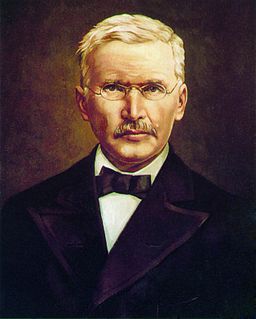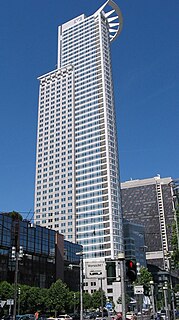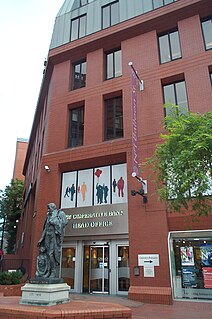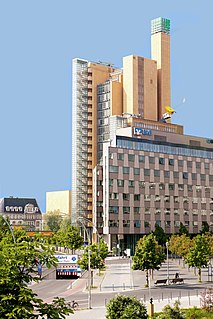Tasks
The DGRV represents the common interests of the cooperative organization in economics, right and tax political affairs in relation to the public, the media and the policy.
Together with European and international organizations, for instance the CCACE (Coordinating Committee of European Associations) in Brussels, the ICA (International Co-operative Alliance) in Geneva or the European combination of the loan banks EACB (European Association of Co-operative Banks) in Brussels, the DGRV represents the interests of the German cooperatives on European level and worldwide.
Besides the DGRV is member of the Internationalen Raiffeisen Union IRU, which is a platform for exchange of experience between the international cooperative organizations. In addition the DGRV advises its members in questions of the marketing and management, accounting and the co-operative examinations system.
Furthermore the DGRV polices all examinations of the regional and federal centers, special institutes and federations for entrance of the co-operative group.
In addition the DGRV promotes the emergence of cooperatives at home and abroad. Particularly in countries of the third world, in addition, in central and Eastern Europe, thereby the economic development is advanced.
DGRV promotes the establishment of new cooperatives in Germany.
Structure
With the DGRV all cooperative sections are organized up to the housing cooperatives. The credit cooperatives, the rural and the commercial cooperatives as well as the consumer cooperatives are members.
The DGRV is structured thus:
The DGRV organises central enterprises of their regional federations - managing 5,500 enterprises and 16.6 million cooperative members, although the primary cooperatives are not a directly members of the DGRV.
Approximately 400,000 people work and 35,000 people train within the German co-operative movement.

Friedrich Wilhelm Raiffeisen was a German mayor and cooperative pioneer. Several credit union systems and cooperative banks have been named after Raiffeisen, who pioneered rural credit unions.

DZ Bank AG is the second largest bank in Germany by asset size and the central institution for around 800 cooperative banks and their around 8,500 branch offices. Within the German Cooperative Financial Group, which is one of Germany's largest private sector financial service organizations, DZ Bank functions both as a central institution and as a corporate and investment bank.

Cooperative banking is retail and commercial banking organized on a cooperative basis. Cooperative banking institutions take deposits and lend money in most parts of the world.
The Zentralverband der deutschen Konsumgenossenschaften, or ZDK is for over one hundred years the syndicate of the Consumer Co-operatives in Germany. Today the federation, which stands in the Lassalle tradition of Cooperative continues to develop the cooperative thought, by promoting the reestablishment of cooperatives in the service sector.

There are several banks that operate under the name "Volksbank".
Co-operative Bank or Cooperative Bank may refer to:

Banking in Germany is a highly leveraged industry, as its average leverage ratio as of 11 October 2008 is 52 to 1 ; its short-term liabilities are equal to 60% of the German GDP or 167% of its national debt.

Deutscher Sparkassen- und Giroverband (DSGV) is the German association of savings banks. It was founded in 1924 by the merger of Deutscher Sparkassenverband and Deutscher Zentral-Giroverband. Its headquarters are located in Berlin.

Union Investment is the investment arm of the DZ Bank Group and part of the cooperative financial services network. It was founded in 1956 and is headquartered in Frankfurt.
The German Banking Industry Committee (GBIC), previously known as the Central Credit Committee is an industry association of the German banking industry. Its decisions are held normative for the national banking sector – either directly by interbank treaties or indirectly by preparing a corresponding ministerial or Bundesbank decision.

The National Association of German Cooperative Banks (BVR) is the umbrella association for the cooperative banking sector in Germany. As of 2015 it had 1,021 members, which represents all the cooperative banks in Germany, including local cooperative banks, PSD banks, Sparda banks, Church banks and Cooperative financial institutions. The cooperative banking sector in Germany has a balance sheet of 1,081 billion euros and employs around 191,000 members of staff.
The Bankcard-Servicenetz is a German ATM card interbank network group provided by the Volksbanken und Raiffeisenbanken services group. Technically it is not an interbank network but uses the pre-existing girocard network. Member banks of this cash credit group charge ATM usage fees at a low level and most customers of the co-operative banks enjoy free withdrawal from their accounts. With 19,200 ATMs the Bankcard-Servicenetz group is the second largest ATM group in Germany.

The German Cooperative Financial Group, German: Genossenschaftliche FinanzGruppe Volksbanken Raiffeisenbanken, is a major cooperative banking network in Germany that includes local banks named Volksbanken and Raiffeisenbanken, the latter in tribute to 19th-century cooperative movement pioneer Friedrich Wilhelm Raiffeisen. The Cooperative Group represents one of the three "pillars" of Germany's banking sector, the other two being, respectively, the Sparkassen-Finanzgruppe of public banks, and the commercial banking sector represented by the Association of German Banks.

Banque Raiffeisen is a Luxembourgish banking and financial services company. Founded in 1926, it is one of the oldest banks in Luxembourg. The bank is independent from foreign shareholders. It is a member of the International Raiffeisen Union (IRU), which is an association of cooperatives based on the ideas of Friedrich Wilhelm Raiffeisen.
VBU Volksbank im Unterland eG is a cooperative German bank situated in Schwaigern, Baden-Wuerttemberg. The bank is a member of the German Cooperative Financial Group and of its representative association, the Bundesverband der Deutschen Volksbanken und Raiffeisenbanken, as well as of the Baden-Wuerttembergischer Genossenschaftsverband.

Konsum is a cooperative retail chain founded in 1945 by the Soviet Military Administration in occupied East Germany. It consisted of grocery stores, retail markets, industrial plants, and restaurants, and was a direct competitor to the Handelsorganisation.

The Bank für Kirche und Diakonie eG - KD-Bank is a credit institute in Dortmund in the legal form of a listed cooperative. The members are mostly institutions from the area of the Protestant church and its deaconry. The KD-Bank is an expert for all financial questions in this sector. The bank offers private customers the full range of banking services. Its goal is not primarily profit maximization but the economic support of members and customers. The bank is a member in the Bundesverband der Deutschen Volksbanken und Raiffeisenbanken (BVR).
Bausparkasse Schwäbisch Hall AG is a building society in Germany, active abroad with subsidiaries in Eastern Europe and China. It has more than 10 million customers. Shareholders are the cooperative central bank DZ Bank in Frankfurt am Main and around 600 cooperative banks. The building society has its headquarters in the city of Schwäbisch Hall in Baden-Württemberg.
This page is based on this
Wikipedia article Text is available under the
CC BY-SA 4.0 license; additional terms may apply.
Images, videos and audio are available under their respective licenses.


















